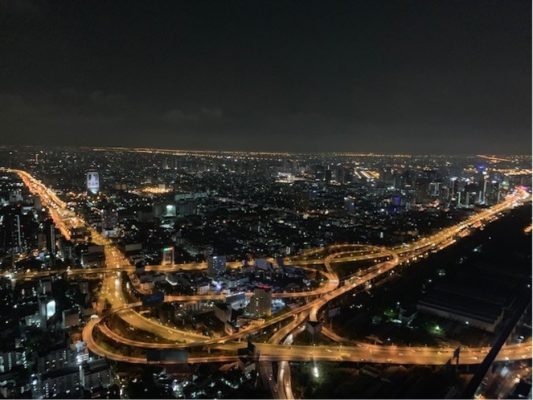Guarding Democracy through Digital Transformation: Implications of Smart City Technologies
The population of cities in low-income countries grew fourfold from 1975 to 2020, according to the United Nations Human Settlements Programme, and these populations are projected to exceed 700 million by 2070. Containing such a significant concentration of the world’s population, cities serve an important role as laboratories of democracy. They have, according to the National Democratic Institute, an “opportunity to prove that democracy delivers and use this digitally connected era to increase understanding of community needs, create effective, equitable, and accessible solutions, and build for a sustainable and ethical future.”
Digital innovations are driving a more interconnected and urbanized world, with many cities increasingly responsible for tackling pressing problems such as climate change, mass migration, and security. Concurrently, cities are pursuing rapid digital transformation, swiftly upgrading their digital infrastructure, and adopting the latest emerging technologies available in commercial markets. These technologies include 5G mobile networks, cloud computing, internet of things (IoT), artificial intelligence (AI), and facial recognition software and provide governments with the opportunity to better leverage data to enhance government services and foster innovative digital ecosystems.

When discussing smart cities, observers generally promote the benefits of these technological investments: how these tools can greatly improve public service delivery, create efficiencies, foster inclusion, inform better policies, and advance economic opportunity. Yet, technology can be harmful, either by design or unintentionally, regardless of its stated purpose. Cybersecurity vulnerabilities, overreliance on connectivity, oversurveillance, social coercion, and bias are frequently cited as pitfalls. Without regulatory guardrails, these consequences can erode democratic standards and norms, including cherished rights, such as privacy and free expression.
Seemingly affordable technologies can exacerbate these vulnerabilities and reinforce autocratic regimes. For example, they can include functionality from pre-installed software that can covertly export data, limit interoperability, and lack cybersecurity safeguards. Chinese companies are often behind these technologies. Valentin Weber notes, “Chinese smart city technologies are forming an authoritarian starter kit for repression.” Technologies from other countries are also used to surveil and repress. Out of 239 5G deals across the world, Huawei won 38% of contracts, while Ericsson won 34% of the contracts, and Nokia won 28% of the contracts. Yet, all surveillance technologies, no matter their origin, can be wielded for social control. Amnesty International identified at least three European companies that sold surveillance technology to China, with some tech being used for the repression of the Uyghur population in Xinjiang province.
The erosion of democratic rights and freedoms can be intensified in a common scenario when city managers or decision-makers do not have the know-how to fully consider potential risks when procuring technologies. They may also not have the multi-disciplinary skills to assess the socioeconomic consequences of their decisions, given the broad (and sometimes unforeseen) implications of “smart” technology.
Businesses have a direct economic incentive to operate within a society that guarantees democratic protections. The erosion of democratic protections can reduce investment in a country, lead to economic uncertainty, and create additional problems for businesses and their customers. For example, the passage of Hong Kong’s national security law has around intellectual property, competition, trade secrets, and privacy for business and their clients.
These businesses also face additional operational challenges related to the diversion of investment and problems retaining and recruiting staff. The unethical use of emerging technologies can tarnish reputations of companies operating in a country, attract regulatory penalties, and lead to decreased revenue and employee satisfaction. In extreme cases, the deterioration of democracy can lead to government coercion. Freedom House noted,
“In Myanmar, the junta compelled the Norwegian service provider Telenor to sell its operations in the country to a military-aligned company, fully consolidating its control over the telecommunications sector.”
As a result, the procurement and deployment of technology often requires a multi-sectoral approach, including data scientists, sociologists, civil society, and the private sector to collaborate to discover how these technologies, and the policies that govern them, may be better designed to protect democratic rights. A key aspect of these efforts is to raise awareness and increase engagement through transparency and advocacy. The CIPE-supported BRI Monitor provides insights into the governance of Belt and Road Initiatives (BRI) in Southeast Asia and the Pacific to uncover governance gaps and inform policy advocacy within and across countries in the region. In one policy brief, the BRI Monitor examined how citizen and public official concerns led to the now-scrapped Philippines “Safe City” project.

Elsewhere, CIPE is working with three organizations in Argentina, Brazil, and Zimbabwe to examine how to strengthen multi-sectoral engagement on smart cities’ impact on democratic principles. In Argentina, CIPE is collaborating with the Center for the Implementation of Public Policies Promoting Equity and Growth (CIPPEC) to develop policy recommendations to strengthen municipal digital capabilities and public service delivery. In Brazil, CIPE is supporting InternetLab to develop a comprehensive guide that provides public officials with clear, actionable, and practical steps to ensure human rights are upheld throughout a municipality’s digitalization journey. Lastly, in Zimbabwe, CIPE is supporting Paradigm Initiative (PIN) to examine citizen perceptions of Zimbabwe’s smart city development and approaches to help safeguard citizen rights.
As the world grapples with the impact of smart technologies, collaborative efforts and informed decision-making will be essential to strike a balance between technological advancement and the preservation of privacy, free expression, and human rights on- and offline. To maximize the promise and avoid the perils of smart city technologies, multi-stakeholder engagement at all levels is required to raise awareness of the impact of smart city technologies on democratic rights and freedoms and design best practice principles, frameworks, and regulations that protect these rights. The rapid urbanization and digital transformation of cities presents both opportunities and challenges for democratic governance and rights. The potential erosion of rights, exacerbated by insufficient understanding and lack of oversight, demands a multi-sectoral approach that includes private sector engagement.
Published Date: December 28, 2023
